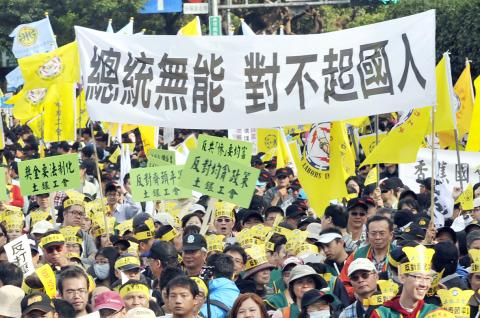About 50,000 people took to the streets in Taipei yesterday to vent their anger against a resolution passed by the legislature last month to slash performance bonuses for employees of state-run enterprises.
The protesters — members of the unions of 29 state-run companies and 27 supporting workers’ associations — demanded that the government review the decision to cut their performance bonuses unless their companies make a profit and find an alternative solution.
The Jan. 6 resolution also lowers the ceiling on such bonuses from the current level of 2.6 months’ salary to 1.2 months.

Photo: Chen Chih-chu, Taipei Times
Moreover, the 2011 performance bonuses for staff at the state-run Taiwan Power Co (台電), CPC Corp, Taiwan (CPC, 台灣中油), Taiwan Sugar Corp (台糖) and Taiwan Water Corp (台灣自來水) must also not be higher than 1.2 months’ salary. Since the 2011 bonuses have already been paid out at the existing rate, employees would have to return the difference, the Legislative Yuan has said.
The decision came amid a public outcry over state employees receiving big bonuses, despite the huge losses incurred by some of their employers.
Taiwan Petroleum Workers’ Union chairman Chuang Chueh-an (莊爵安) yesterday said the Legislative Yuan’s decision was an abuse of the government’s administrative powers.

Photo: Chen Chih-chu, Taipei Times
Chuang said that the “one-size-fits-all” principle utilized in slashing funds across all state-owned companies disregarded the differences between them and nullifiesd the purpose of the performance bonus: giving staff an incentive to work harder.
Chao Ming-yuan (趙銘圓), the executive director of the Taiwan Tobacco and Wine Board (TTWB) factory union, said the legislature had not given enough consideration to the decision.
The TTWB had a pre-tax surplus of NT$12 billion (US$404.9 million) and post-tax surplus of NT$11 billion last year, he said, adding that if it were to slash its bonuses and adhere to a particular ceiling, lower-level workers would have no incentive to improve their performance.
During the protest, Lin Yu-fa (林裕發), head of the Taiwan Sugar workers’ union, launched a campaign to form a political party to defend the rights and benefits of state-run enterprise workers.

CALL FOR SUPPORT: President William Lai called on lawmakers across party lines to ensure the livelihood of Taiwanese and that national security is protected President William Lai (賴清德) yesterday called for bipartisan support for Taiwan’s investment in self-defense capabilities at the christening and launch of two coast guard vessels at CSBC Corp, Taiwan’s (台灣國際造船) shipyard in Kaohsiung. The Taipei (台北) is the fourth and final ship of the Chiayi-class offshore patrol vessels, and the Siraya (西拉雅) is the Coast Guard Administration’s (CGA) first-ever ocean patrol vessel, the government said. The Taipei is the fourth and final ship of the Chiayi-class offshore patrol vessels with a displacement of about 4,000 tonnes, Lai said. This ship class was ordered as a result of former president Tsai Ing-wen’s (蔡英文) 2018

UKRAINE, NVIDIA: The US leader said the subject of Russia’s war had come up ‘very strongly,’ while Jenson Huang was hoping that the conversation was good Chinese President Xi Jinping (習近平) and US President Donald Trump had differing takes following their meeting in Busan, South Korea, yesterday. Xi said that the two sides should complete follow-up work as soon as possible to deliver tangible results that would provide “peace of mind” to China, the US and the rest of the world, while Trump hailed the “great success” of the talks. The two discussed trade, including a deal to reduce tariffs slapped on China for its role in the fentanyl trade, as well as cooperation in ending the war in Ukraine, among other issues, but they did not mention

Japanese Prime Minister Sanae Takaichi yesterday lavished US President Donald Trump with praise and vows of a “golden age” of ties on his visit to Tokyo, before inking a deal with Washington aimed at securing critical minerals. Takaichi — Japan’s first female prime minister — pulled out all the stops for Trump in her opening test on the international stage and even announced that she would nominate him for a Nobel Peace Prize, the White House said. Trump has become increasingly focused on the Nobel since his return to power in January and claims to have ended several conflicts around the world,

GLOBAL PROJECT: Underseas cables ‘are the nervous system of democratic connectivity,’ which is under stress, Member of the European Parliament Rihards Kols said The government yesterday launched an initiative to promote global cooperation on improved security of undersea cables, following reported disruptions of such cables near Taiwan and around the world. The Management Initiative on International Undersea Cables aims to “bring together stakeholders, align standards, promote best practices and turn shared concerns into beneficial cooperation,” Minister of Foreign Affairs Lin Chia-lung (林佳龍) said at a seminar in Taipei. The project would be known as “RISK,” an acronym for risk mitigation, information sharing, systemic reform and knowledge building, he said at the seminar, titled “Taiwan-Europe Subsea Cable Security Cooperation Forum.” Taiwan sits at a vital junction on